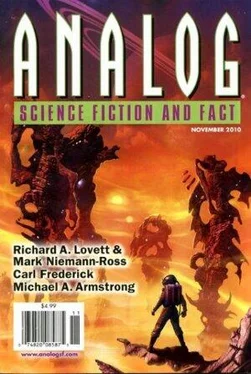Allen Steele - The Zoo Team
Здесь есть возможность читать онлайн «Allen Steele - The Zoo Team» весь текст электронной книги совершенно бесплатно (целиком полную версию без сокращений). В некоторых случаях можно слушать аудио, скачать через торрент в формате fb2 и присутствует краткое содержание. Год выпуска: 2010, Издательство: Dell Magazines, Жанр: Фантастика и фэнтези, на английском языке. Описание произведения, (предисловие) а так же отзывы посетителей доступны на портале библиотеки ЛибКат.
- Название:The Zoo Team
- Автор:
- Издательство:Dell Magazines
- Жанр:
- Год:2010
- ISBN:нет данных
- Рейтинг книги:3 / 5. Голосов: 1
-
Избранное:Добавить в избранное
- Отзывы:
-
Ваша оценка:
- 60
- 1
- 2
- 3
- 4
- 5
The Zoo Team: краткое содержание, описание и аннотация
Предлагаем к чтению аннотацию, описание, краткое содержание или предисловие (зависит от того, что написал сам автор книги «The Zoo Team»). Если вы не нашли необходимую информацию о книге — напишите в комментариях, мы постараемся отыскать её.
The Zoo Team — читать онлайн бесплатно полную книгу (весь текст) целиком
Ниже представлен текст книги, разбитый по страницам. Система сохранения места последней прочитанной страницы, позволяет с удобством читать онлайн бесплатно книгу «The Zoo Team», без необходимости каждый раз заново искать на чём Вы остановились. Поставьте закладку, и сможете в любой момент перейти на страницу, на которой закончили чтение.
Интервал:
Закладка:
So here was the Justice League International, and here was the Legion of Super Pets. And guess which one was assigned to Zulu Team, the first group to spend three months aboard the Mess?
At first, Miguel, Ron-Jon, and I could hardly believe our luck. As the first group to go up, we’d also be the first to come back down; that meant we’d have time to goof-off until the final crew selection was made and Phase 2 would begin. That, along with the fact that none of us really belonged there in the first place, made each of us wonder what we’d done deserve our great fortune.
We weren’t lucky. The exact opposite, in fact. But it took awhile for us to find that out.
When Skycorp built the Mars Expedition Simulator, they used inflatable modules that could be easily lifted into orbit aboard an expendable launch vehicle. The Mess had three modules, each about the size of a bus, connected together in tandem; they were made of some industrial-grade polymer that could take sea-level pressurization, and had various solar arrays, radiator panels, tanks, and antennas sticking out in all directions. At the aft end of the station was a hard-hull airlock module, and attached to it was a three-man re-entry vehicle that Miguel, Ron-Jon, and I were supposed to pretend didn’t exist until the last day of our mission, when we’d be allowed to climb aboard for the ride back to Earth.
I was familiar with inflatable modules from my time on the powersat construction project. Beamjacks called them “hot dogs” and although the company kept insisting that they were safe, none of us trusted them very much. They were a cheap, lightweight substitute for metal spacecraft hulls, and even though they’d been proven to be resistant to cosmic radiation and micrometeorites, everyone who used them was aware that they were vulnerable to one particular kind of orbital threat.
And, damn it, that’s exactly what happened to the Mess. It got hit by a piece of space junk.
Sure, USAF Space Command constantly tracks the location of all known orbital debris, and periodically the ground controllers in Houston would gently maneuver our little station so that it was out of the way of a fuselage panel, screwdriver, or third-stage fairing that would come barreling toward us at 3,600 miles an hour. But the boys at Cheyenne Mountain can’t locate and track everything. Now and then, some object gets lost or jettisoned that isn’t reported for one reason or another—usually stupidity—and it orbits Earth until it either finally falls into the atmosphere and burns up, or hits something else up there and thus causes someone to have a really lousy day.
I had no idea what struck the Mess other than it was bigger than a washer and smaller than a pen, and it made our lives really interesting. Within seconds of the thump-and-bang of it hitting the simulator, a very non-simulated master alarm went off in the command module. Miguel and I were still staring at each other when Ron-Jon came back through the hatch.
“Blowout,” he said.
“Uh-huh.” Miguel calmly put the fake knife back in his pocket. “Emergency stations, gentlemen.”
In science fiction movies and novels, you often see astronauts going into a blind panic when there’s a catastrophic accident. Who knows, that sort of reaction may happen from time to time. But it didn’t happen to us. Miguel, Ron, and I were well-trained and experienced, and since we’d already rehearsed emergency procedures for the Mess, each of us knew what to do. As team leader, Miguel went straight to the command module, where he entered the six-digit code into the main computer that disengaged the simulation routines and returned the Mess to normal operation. While he did this, Ron-Jon went about trying to locate the source of the blowout and, if possible, making temporary repairs. My job was to go to the airlock, suit up, and prepare to either go EVA and fix the problem from outside the Mess or, if all else failed, get the re-entry vehicle ready to serve as a lifeboat in case we had to abandon the station.
I was still blessing some Skycorp engineering team for having developed zero-prebreathe spacesuits that could be donned and cycled through an airlock in minutes instead of hours when I heard Miguel’s voice through the earpiece of my bunny cap. “Huntsville, this is Zulu Team,” he said, as casually as it this was a routine radio check . “We’re reporting an in-flight emergency. Suspected collision with a foreign object and possible cabin depressurization. Do you copy?”
A few seconds went by, during which I thrust my head through the suit’s neck ring and reached back with both hands to seal the back-hatch. I was reaching for my gloves when Skycorp Control came over the comlink. We were no longer in time-delay, so we heard Capcom at once.
“Ah, affirmative, Zulu, we copy. Is this Mission Commander LaCosta?”
Miguel must not have yet turned the cameras back on, and was relying on voice-only communications. “Affirmative, Huntsville,” he said.
“Commander LaCosta, weren’t you experiencing another in-flight emergency just a few minutes ago?”
“Negative, Huntsville.”
“Please explain.”
Oh, hell. I’d almost totally forgotten the little skit we’d performed for Skycorp Control’s benefit.
“Huntsville, we apologize,” Miguel said. “That was a practical joke on our part. I assure you that this is not another joke.”
Before Capcom could reply, Ron-Jon’s voice came on. “Huntsville, this is Lieutenant Commander Ronald Johnson. I have not been harmed. Commander LaCosta did not really stab anyone. And, no, this is not another joke. Over.”
I quickly activated my suit radio, switched over to the channel for the Mess’s long-range communications system. “Huntsville, this is Lieutenant Commander…”
“We copy, Zulu.” Capcom apparently didn’t want my side of the story; the fact that I was alive and well was enough for them. “We’ll discuss the earlier incident later. Please describe your current situation. Do you copy?”
“Roger that, Huntsville.” There was a hint of relief in Miguel’s voice; Skycorp Control no longer believed that he’d just planted a six-inch stiletto in my chest. “We’ve gotten a cabin leak message and are showing a DP/DT of .125 psi. We’re currently searching for the source, and we’re preparing the REV for Orbit Mal Proc.”
“We copy, Zulu.”A long pause, during which I imagined the scene in Skycorp Control: Capcom, Flight, and the rest of the ground team, hunched over their consoles as they muttered into one another’s headsets, trying to decide whether they should take the Zoo Team at their word. Because let’s face it: we hadn’t exactly been anyone’s ideal astronauts, and this wasn’t the first stunt we’d pulled. Which is why Zulu Team was called the Zoo Team more often than not.
I was reaching for the rack holding my gloves and helmet when my gaze fell upon the one porthole in the Mess that didn’t have a fake image of Mars on the other side of the glass. From here, I could see Earth, 260 nautical miles below… and it didn’t look right. What should have been a steady view of a gently curved horizon was instead a starless black void. A couple of seconds later, the limb of the Earth appeared, the South Pacific a bright blue expanse shaded by misty white clouds. But then it turned upside-down and tumbled away, replaced once more by nothingness.
I hissed under my breath, then touched my mic wand. “Hate to say it, gentlemen, but our problems just got worse.”
The Mess had been placed in equatorial low orbit and Zulu Team was about three weeks away from being sent up to it when we learned the true nature of our mission.
By then, we were nicknamed the Zoo Team, and with good reason. Miguel, Ron, and I tried hard to be proper Space Cadets, but our mischievous ways kept coming back to us. Every morning for two months, the three of us arrived at the Skycorp training complex in Huntsville for ten to twelve hours of intensive exercises overseen by “technical associates” who’d never been in space themselves. So we’d find ourselves being lectured on orbital rendezvous techniques by a kid who’d never been in a cockpit—not a real one, at least—or receiving instructions on how to don a spacesuit from some dweeb who wore Velcro-strap sneakers because shoelaces were too much of a hassle.
Читать дальшеИнтервал:
Закладка:
Похожие книги на «The Zoo Team»
Представляем Вашему вниманию похожие книги на «The Zoo Team» списком для выбора. Мы отобрали схожую по названию и смыслу литературу в надежде предоставить читателям больше вариантов отыскать новые, интересные, ещё непрочитанные произведения.
Обсуждение, отзывы о книге «The Zoo Team» и просто собственные мнения читателей. Оставьте ваши комментарии, напишите, что Вы думаете о произведении, его смысле или главных героях. Укажите что конкретно понравилось, а что нет, и почему Вы так считаете.












